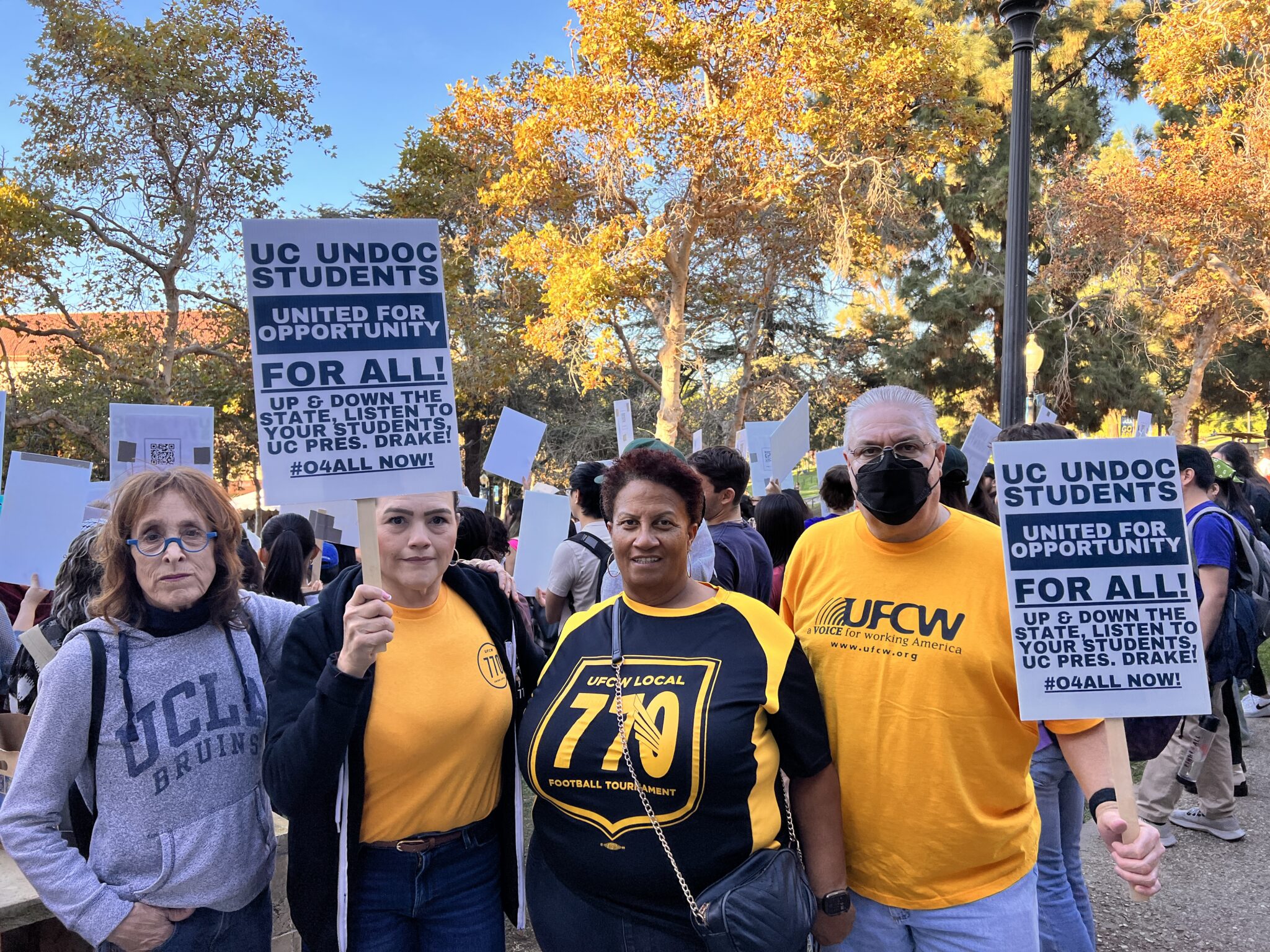
Meredith Gudesblatt is a student at Harvard Law School and a member of the Labor and Employment Lab.
In Today’s News and Commentary, the Department of Homeland Security asks the Supreme Court to lift a racial-profiling ban, the University of California loses a case involving hiring undocumented students, and UC Berkeley’s Labor Center launches a database to empower union negotiators.
Earlier this month, Liana highlighted Vazquez Perdomo v. Noem and the July 11th Temporary Restraining Order (TRO) that prohibits ICE agents from “conducting roving patrols without reasonable suspicion and denying access to lawyers.” Over the weekend, Bloomberg reported that last Friday a three-judge panel of the Ninth Circuit Court of Appeals unanimously denied the government’s request to pause the TRO that administration officials allege is impeding law enforcement operations. This means that immigration agents are still barred from profiling activity in the Central District of California (which covers Los Angeles, San Bernardino, Riverside, Ventura, Orange, San Luis Obispo, and Santa Barbara Counties), including questioning individuals at places where migrants look for day labor, such as Home Depot parking lots. On Wednesday, however, immigration agents conducted “operation trojan horse” and raided the Westlake Home Depot again by hiding in a Penske rental truck. Both United Farm Workers and Senior Fellow at the American Immigration Council Aaron Reichlin-Melnick voiced concerns that this raid demonstrates the federal government may have violated the July TRO. And just last night, the Trump administration asked the Supreme Court to lift the injunction restricting the ability of ICE and Border Patrol to stop and question people based on factors such as speaking Spanish, being Latino, doing day labor, or being in certain areas. Ultimately, the Solicitor General’s brief requests permission for immigration agents to racially profile and stop and question anyone in the Central District of California based solely on the person being Latino and speaking Spanish.
On Tuesday, a California state court issued a decision in Umaña Muñoz, et al v. Regents University of California, holding that the University of California’s restrictions on employment of undocumented immigrants violates state laws. After years of organizing, two former University of California students filed a lawsuit in 2024 seeking a “‘writ of mandate directing the Regents to abandon its unsound and unlawful policy’ of refusing to hire undocumented students for on-campus work.” Specifically, the petitioners alleged that the Regents aren’t barred from hiring undocumented students because the Immigration Reform and Control Act of 1986, which prohibits the hiring of undocumented people, does not apply to state government employers. The petitioners also challenged the policy as a violation of the California Fair Employment and Housing Act’s prohibition on immigration status discrimination. The Regents’ policy of refusing to hire undocumented students on campus effectively bars undocumented students, many of whom are ineligible for DACA since the government stopped accepting new applications in 2018, from pursuing advanced degree programs because they cannot satisfy teaching or other employment requirements. A three-judge panel at the California Court of Appeal, First District in Los Angeles ruled that the policy against hiring undocumented students discriminates on the basis of immigration status. The court states that the unlawful policy cannot “be justified solely on a determination that discontinuing the policy might result in significant harm to the students and employees of the University based on perceived risks of potential federal law violations, even reasonable risks based on a careful assessment of what positions federal actors might take.” The University of California has yet to indicate whether it will appeal the decision.
Lastly, the UC Berkeley Labor Center has launched a new tool to help labor union negotiators, researchers, media, and policymakers better understand how unions have addressed workplace technologies through collective bargaining. The searchable inventory was developed by researcher Lisa Kreseg and draws on a multi-decade analysis of more than 500 union contracts and collective bargaining provisions, covering over 175 union agreements and referencing over 950 technology-related contract provisions. The database includes information from the U.S. Labor Department’s Office of Labor-Management Standards and the Office of Personnel Management’s Collective Bargaining Agreements database, as well as data from contracts pulled from union and employer websites and direct contributions from union leaders. Each provision or summary of a provision is accompanied by a link to the complete collective bargaining agreement, allowing users to gain insight into how unions have secured rights and protections in the face of AI, surveillance, and other digital technologies.






Daily News & Commentary
Start your day with our roundup of the latest labor developments. See all
March 3
In today’s news and commentary, Texas dismantles their contracting program for minorities, NextEra settles an ERISA lawsuit, and Chipotle beats an age discrimination suit. Texas Acting Comptroller Kelly Hancock is being sued in state court for allegedly unlawfully dismantling the Historically Underutilized Business (HUB) program, a 1990s initiative signed by former Governor George W. Bush […]
March 2
Block lays off over 4,000 workers; H-1B fee data is revealed.
March 1
The NLRB officially rescinds the Biden-era standard for determining joint-employer status; the DOL proposes a rule that would rescind the Biden-era standard for determining independent contractor status; and Walmart pays $100 million for deceiving delivery drivers regarding wages and tips.
February 27
The Ninth Circuit allows Trump to dismantle certain government unions based on national security concerns; and the DOL set to focus enforcement on firms with “outsized market power.”
February 26
Workplace AI regulations proposed in Michigan; en banc D.C. Circuit hears oral argument in CFPB case; white police officers sue Philadelphia over DEI policy.
February 25
OSHA workplace inspections significantly drop in 2025; the Court denies a petition for certiorari to review a Minnesota law banning mandatory anti-union meetings at work; and the Court declines two petitions to determine whether Air Force service members should receive backpay as a result of religious challenges to the now-revoked COVID-19 vaccine mandate.